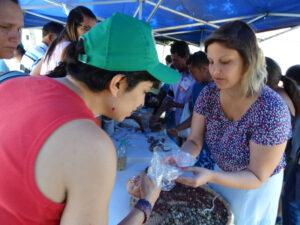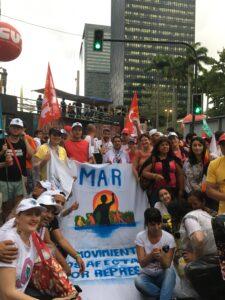Brazil at the Crossroads: Organizing for Land and Water Rights in Dangerous Times
The second year under Brazil’s parliamentary coup is now underway. Despite the political corruption and backlash against social movements, Grassroots International partners refuse to accept the dismantling of previous gains and are creating new systems to survive.
Throughout 2017 we received news and updates from our partners in Brazil about the realities on the ground during the first full year under the government of unelected President Michele Temer. The parliamentary coup, which occurred in the summer of 2016 driven by the Brazilian right wing – the agribusiness elite, conservative fundamentalist Christians, and media monopoly – took power by consolidating forces and exploiting legitimate public anger over political corruption. They impeached President Dilma Rousseff who, ironically, was one of the few high-powered politicians in the country who didn’t have concrete proof of corruption against her (she was impeached for moving money from public banks to temporarily cover government programs. This maneuvering of funds has been done before without being considered an impeachable offense.) Her own Vice President turned against her and was installed as President in May 2016, first on a temporary basis during Dilma’s initial suspension, and then to serve out the rest of her mandate through 2018 when the impeachment was finalized.
Our partners saw the clouds gathering from a distance as the coup unfolded and they mobilized and publicly denounced the lack of due diligence and hypocrisy surrounding what was happening. For many, it felt like echoes of the era of the military dictatorship (from 1964 to 1985), a period that still serves as a warning of what can happen when democracy is sidelined.
On April 28, 2017, social movements, unions and activists organized a general strike. An estimated 40 million workers walked out paralyzing business as usual. Schools, public transportation, banks and businesses were closed in Brazil’s biggest cities. This was the first general strike in decades and one of the largest in the country’s history.
Temer, of the conservative Brazilian Democratic Movement Party (PMDB) (himself convicted of violating election laws in a local election in São Paulo and barred from running for office until 2024) had already made dramatic changes since taking office – starting off with eliminating the ministries of Human Rights and Racial Equality, Women, and Agricultural Development. In July 2017, his administration was successful in passing a labor reform package which reversed 40 years of progress in workers’ rights and protections. This “flexibilization” of labor laws, as it was referred to, weakened collective bargaining rights, made it easier for employers to hire workers on a part-time basis without providing job security, lowered wages and allowed agreements between employers and employees to override labor laws.
Creating Change in the Ground
The Popular Peasant Movement (MCP), which organizes rural families and small-scale farmers, has been hugely impacted by this administration’s budget cuts. One of their most innovative and successful projects is their Creole Seeds Project, where farmers rescue, protect, reproduce and distribute native non-GMO seeds.
 For many years the Creole Seeds Project has had a working partnership with government agencies that provide technical support and help with the redistribution of seeds. Working with these agencies, MCP was able to produce 300-600 tons of seeds a year. With recent budget cuts, however, the Seed Acquisition Program, which they worked with to purchase and distribute the seeds, was cut to the point that they were only able to buy 50 tons of seeds in 2017. This means that farmers who want to grow non-GMO foods no longer have access to those seeds, and more small-scale farmers will likely turn to conventional seed packages.
For many years the Creole Seeds Project has had a working partnership with government agencies that provide technical support and help with the redistribution of seeds. Working with these agencies, MCP was able to produce 300-600 tons of seeds a year. With recent budget cuts, however, the Seed Acquisition Program, which they worked with to purchase and distribute the seeds, was cut to the point that they were only able to buy 50 tons of seeds in 2017. This means that farmers who want to grow non-GMO foods no longer have access to those seeds, and more small-scale farmers will likely turn to conventional seed packages.
For the peasant families, the coup has resulted in increased poverty, due to cuts in important public policies. Families organized in the MCP suffer all these impacts directly. – Sandra Alves, MCP
So MCP is transforming how they do things.
“The way to face this moment is to strengthen our work with seeds and the production of healthy foods. We are organizing a cooperative to focus on this – to organize peasant production,” said Sandra Alves of MCP’s National Coordination.
The cooperative will make it possible to continue their work with Creole seeds and to grow agroecological vegetables to sell at a competitive price. Speaking of the challenges of the past year, Sandra said that “the struggle is far greater and more difficult, but we remain firm. And more than ever your support has been critical.”
Agrarian Reform at a Standstill, Activists Face Violence
For rural people seeking land for their families and livelihood, the process of agrarian reform has come to a practical standstill. The Landless Workers Movement (MST), which has been organizing families for over 30 years to reclaim land through the process of land occupation and sustainable farming, has been facing a sharp increase in evictions, violent attacks and assassinations. The threats are at higher level than they have been in decades.

In 2017 the Pastoral Land Commission (CPT), a Brazilian human rights organization that works closely with rural movements, reported that at least 65 rural activists were assassinated in 2017. In April 2017, nine landless workers were tortured and assassinated in the state of Mato Grosso. The northern state of Pará saw the most severe increase in violence over land disputes – 20 people were assassinated in that state alone.
According lawyer José Batista Afonso, of the CPT, policies implemented by the Temer government have given carte blanche to large landowners to act with impunity. “This is the largest escalation of violence that we have seen in many years, and the lack of action [from authorities] is undoubtedly a result of the relationship between the large landowners and the Temer government. They have the green light to resolve the issue in their own way.”
Unfortunately, this trend is already continuing into 2018. We were devastated to learn of the assassination of another MST leader, Márcio Matos, on January 24th, 2018.
Amid this challenging context, the MST continues to organize families to occupy land, create sustainable communities, and promote the rights of women, LGBT people, youth and all workers. With support from Grassroots International, the MST is renovating and expanding training centers in twelve states, including the Florestan Fernandes National School. These centers provide political education, agricultural training in agroecology and spaces for conferences and cultural events for the movement.
Water, Power and Rights
In 2017 the Movement of People Affected by Dams (MAB) brought together 3,500 families that have been impacted by mega-dam projects for their 8th National Encounter in Rio de Janeiro. People from dam-affected communities came by bus from all parts of the country, many traveling for days, bringing with them mattresses, tents, food and cooking equipment. The purpose of the gathering was for members to get to see the breadth and depth of their movement, to gain a deeper understanding of the current context and challenges facing the country – particularly around the threats of privatization – and to put forward energy sovereignty (energy production for the people, controlled by the people) as an alternative to for-profit energy production.
 MAB joined forces with other social movements to make this national gathering happen, including the MST, MCP, the Popular Youth Uprising and the Popular Brazil Front. There was also international participation from many groups including the Movement of People Affected by Dams in Latin America (MAR) and the US Climate Justice Alliance. MAB particularly highlighted the situation that families in the Mariana region of Brazil are facing two years after a mining tailings dam burst there, resulting in the largest environmental disaster in Brazil’s history. Families that lost their homes and livelihoods are still awaiting compensation and the companies responsible for the disaster have carried on with impunity.
MAB joined forces with other social movements to make this national gathering happen, including the MST, MCP, the Popular Youth Uprising and the Popular Brazil Front. There was also international participation from many groups including the Movement of People Affected by Dams in Latin America (MAR) and the US Climate Justice Alliance. MAB particularly highlighted the situation that families in the Mariana region of Brazil are facing two years after a mining tailings dam burst there, resulting in the largest environmental disaster in Brazil’s history. Families that lost their homes and livelihoods are still awaiting compensation and the companies responsible for the disaster have carried on with impunity.
2018 will bring more challenges for our partners in Brazil – the fallout of cuts to social programs in 2017 will be felt much more deeply in 2018, there will be a big fight against a proposed social security reform that would raise the retirement age and restrict benefits, and there will be a presidential election in October.
This year our partners will be working to strengthen their autonomous sustainability through creating cooperatives and providing training in agroecology and political education. They will be building strong national and international alliances because the rightwing and neoliberal forces they are facing are the same that social movements everywhere are facing. They will be training youth and working-class people to produce media and disseminate information through outlets like Brasil de Fato (a Grassroots International grantee) to counter the narrative put forward by the mainstream media. They will mobilize, strategize and keep working to build a better world for all.


